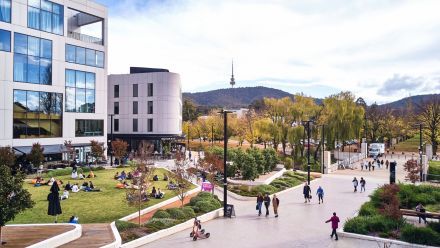ANU innovation boosting green and manufacturing revolutions
A new training centre hosted by The Australian National 51³Ô¹ÏÍø (ANU) is upskilling the next generation of researchers in cutting-edge 3D imaging and analysis technology to help repair bones, safely store CO2, deactivate viruses on surfaces and recycle car parts among a range of critical applications.
The ARC Training Centre for Multiscale 3D Imaging, Modelling and Manufacturing, M3D Innovation, is using a "disruptive" digital imaging, analysis, modelling and manufacturing technology developed at ANU for more than 15 years.
The micro-imaging technology provides users with 3D "super vision" into a range of materials at scales ranging from metres to 10 nanometres - a measurement 1,000 times smaller than the width of a human hair.
The technology was originally developed by a team of researchers with M3D Innovation Director, Professor Mark Knackstedt, who has won a Eureka Prize as well as an ENI award - the 'Nobel prize' for energy resources research - for his innovation.
"Our centre brings together researchers from ANU and Queensland 51³Ô¹ÏÍø of Technology, 15 industry partners and end users to harness the 'super-power' of advanced imaging and analysis technologies," Professor Knackstedt said.
"We are building a vibrant research training environment and creating a workforce that is expert in applying the new technology to a range of new industry sectors and mentoring PhD students and early career researchers in industrial collaboration and commercialisation.
"And we've already made some incredible strides through a range of exciting projects. This includes using the technology to investigate green steel production via hydrogen based processes; safely store CO2 in aquifers to fight climate change; recycling car parts for a circular economy; regenerating bones with biodegradable scaffolds; and designing custom bone implants.
"Our partners at QUT have developed new technology during the COVID-19 pandemic, using etching techniques to roughen surfaces to deactivate bacteria and viruses. This is a technique that could be used to deactivate COVID-19 on metal surfaces in hospitals and clinical settings."
M3D Innovation is funded by the Australian Government under the Australian Research Council Industrial Transformation Training Centres scheme. "We are really grateful for the Australian Government's investment and support for this really important field of science and for the translation to industry partners," Professor Knackstedt said.
"ANU and Australia are world-leaders in this space. Our work at M3D Innovation will boost our capacity and deliver new graduates and researchers with critical skills and knowledge across novel manufacturing, modelling and imaging."


